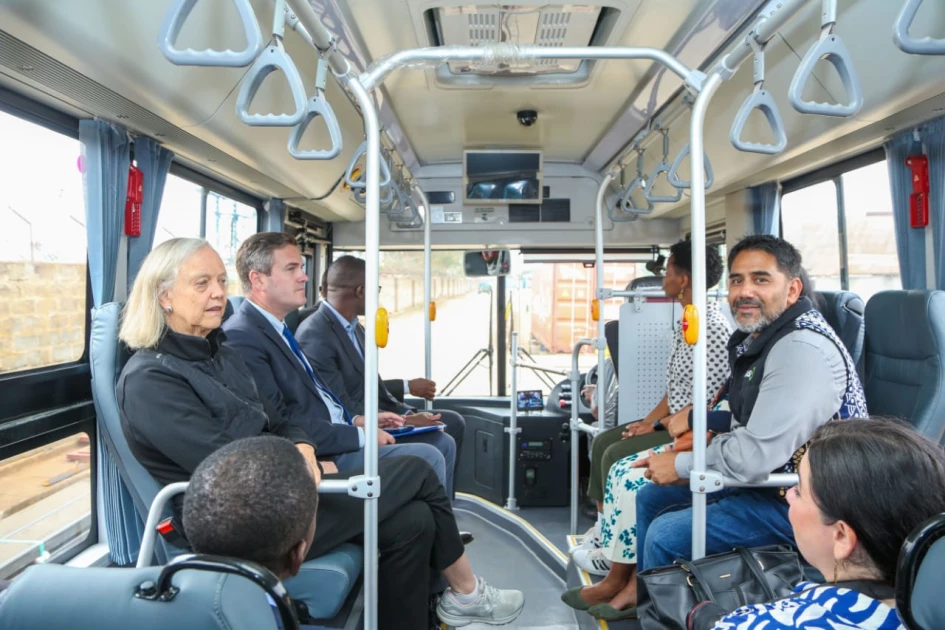BasiGo’s electric bus initiative gets Ksh.1.B U.S. boost, aims for 1,000 buses by 2025

Meg Whitman, U.S. Ambassador inside an EBus when she visited BasiGo’s Electric Bus production line at the KVM plant in Thika on Thursday, August 15.
Her visit comes three months after Kenyan President William Ruto's historic state visit to the United States, which President Joe Biden described as ushering in a "new era of technological cooperation."
During her visit, Whitman highlighted the two countries' growing alliance as well as the United States' commitment to Kenya's green industrialisation goals.
The centrepiece of this commitment is a $10 million loan approved by the United States International Development Finance Corporation (DFC) for BasiGo, a major player in Kenya's e-mobility industry.
This funding is intended to significantly increase BasiGo's fleet of electric buses and accelerate the country's transition away from diesel-powered vehicles.
BasiGo, an e-mobility company dedicated to revolutionising Kenya's public transport system, recently reached a significant milestone with the assembly of its first two E9 Kubwa buses.
These 9-meter electric buses are specifically designed for the Kenyan public service vehicle (PSV) market.
The company has already received over 500 reservations from bus operators in Nairobi, as well as 300 from Kigali, Rwanda, indicating a strong regional demand for electric buses.
The DFC's financial assistance will allow BasiGo to increase its production from five buses per month to 20 buses per month by 2025.
This expansion is expected to result in the production of 1,000 electric buses over the next three years.
According to Vibhuti Jain, DFC's Regional Managing Director for Africa, this increase in production will not only meet rising demand, but will also help to create jobs and improve Kenya's overall quality of life.
Jit Bhattacharya, CEO and Co-Founder of BasiGo, welcomed the loan emphasizing that the funding would significantly enhance urban mobility and offer new opportunities for transit operators.
It also aligns with Kenya’s National Climate Change Action Plan by helping reduce greenhouse gas emissions. “This investment is crucial for scaling up our production and accelerating the transition to electric buses,” Bhattacharya said. “In the long term, as we locally assemble and manufacture these technologies at KVM, Kenya can become a key supply chain hub for green technology worldwide.”
Whitman’s visit to KVM highlights the importance of this U.S.-Kenya partnership in advancing both nations’ strategic interests.
“The United States is committed to supporting Kenya’s transition to green technologies and fostering local manufacturing capabilities,” Whitman stated during her tour. “This partnership not only strengthens our economic ties but also contributes to global sustainability efforts.”
The assembly line at KVM is set to create 300 green manufacturing jobs, further reinforcing Kenya’s green industrialization strategy.
As part of its ongoing commitment to green transportation, BasiGo has already seen several local operators, including Citi Hoppa and Super Metro, receive the first batch of locally assembled electric buses.
Other operators, such as Oma Sacco, MetroTrans, KBS, Embassava, East Shuttle, and Latema Sacco, are also set to integrate these electric buses into their fleets.
Marian Muthui, BasiGo Kenya’s Head of Manufacturing, noted that the assembly line is currently producing around five buses per month.
This production rate is expected to rise significantly to meet the growing demand, with plans to increase to 20 buses per month by 2025. “The assembly line is currently producing about five buses per month and is expected to increase to 20 buses per month in 2025 to deliver the 500 reservations by operators in Kenya,” Muthui said.
Want to send us a story? SMS to 25170 or WhatsApp 0743570000 or Submit on Citizen Digital or email wananchi@royalmedia.co.ke
Comments
No comments yet.


Leave a Comment